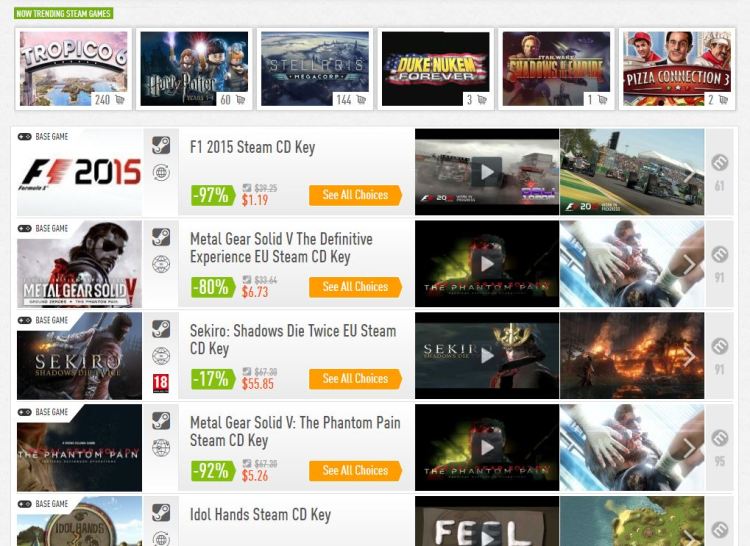Valve found itself in the crosshairs of European regulators today. The European Commission sent a notice to the owner and operator of the Steam game-distribution platform as well as five other game publishers. As part of an ongoing investigation, the EC noted the six companies made an agreement to lock certain game activation keys to specific countries within the European Economic Area. This violates one of the core policies of the EU, which is to maintain a single European market.
The region-locked keys enabled developers to sell codes on third-party stores or at physical retailers throughout Europe. But while the keys would work in one country, they may not have activated for someone in a neighboring nation.
Valve acknowledges that it worked with publishers Bandai Namco, Capcom, Focus Home Entertainment, Koch Media (Deep Silver), and ZeniMax (Take-Two) to enable those region locks. But also notes that this does not involve any sales on its store.
“The EC’s charges do not relate to the sale of PC games on Steam,” Valve spokesperson Doug Lombardi wrote in a note to GamesBeat. “Instead the EC alleges that Valve enabled geo-blocking by providing Steam activation keys and — upon the publishers’ requests — locking those keys to particular territories within the EEA.”
June 5th: The AI Audit in NYC
Join us next week in NYC to engage with top executive leaders, delving into strategies for auditing AI models to ensure fairness, optimal performance, and ethical compliance across diverse organizations. Secure your attendance for this exclusive invite-only event.
Valve says it (mostly) stopped region locking in 2015
Lombardi goes on to say that this practice was never widespread. It also claims that it never applied this to its own games and thinks that the liability for region locking lies fully with the publishers and not the platform holder.
“The region locks only applied to a small number of game titles,” said Lombardi. “Approximately just 3% of all games using Steam — and none of Valve’s own games — at the time were subject to the contested region locks in the EEA. Valve believes that the EC’s extension of liability to a platform provider in these circumstances is not supported by applicable law.”
Valve has also largely ceased region locking except where it needs to comply with regional laws.
“Nonetheless, because of the EC’s concerns, Valve actually turned off region locks within the EEA starting in 2015, unless those region locks were necessary for local legal requirements,” said Lombardi. “Such as German content laws or geographic limits on where the Steam partner is licensed to distribute a game.”
Why does region locking even exist?
You may wonder why publishers would want to region lock a game, and the answer is economics. While the EEA is a single market, its member countries vary widely in terms of their GDP per capita.
Germany has a GDP per capita of $47,000, according to CountryEconomy.com. Bulgaria, meanwhile, has a GDP per capita of $9,000. And Germany is not even in the top 10 of GDP per capita in the EU. Norway, which in No. 3, has a GDP per capita of $82,000. That is nine times the GDP produced per person in Bulgaria.
For comparison, Massachusetts had the highest GDP per capita of all U.S. states in 2018 at $66,000. Mississippi had the lowest at $32,000. But that gap is much closer than in the EU.
The difference in purchasing power between a person in Bulgaria and a person in Norway creates an issue of pricing. Ideally, publishers want to sell a game for one price in Norway and a significantly lower price in Bulgaria. But the EU is prohibiting that in this situation.
“The elimination of region locks will also mean that publishers will likely raise prices in less affluent regions to avoid price arbitrage,” said Lombardi. “There are no costs involved in sending activation keys from one country to another and the activation key is all a user needs to activate and play a PC game.”
Arbitrage is usually bad for digital goods
Arbitrage is when you purchase a good in one market and sell it for a higher price elsewhere. This isn’t always a bad thing. In a healthy, functioning market (assuming those exist), arbitrage is an important signal among the noise. It helps establish fair prices. And for physical goods, it usually reflects that middlemen are willing to do the logistical work that companies and consumers aren’t willing to do.
But for digital goods, those benefits aren’t nearly as obvious. The arbitrage seller is usually just sending an activation key through email to take advantage of regulation like the EU’s.
If ZeniMax sells an The Elder Scrolls V: Skyrim key for $10 in Bulgaria and $30 in Norway, a third-party will inevitably come along to buy all of the Bulgarian keys to sell for $25 in Norway.
This is bad for everyone. It pushes up prices in Bulgaria, as Valve warns will happen. But leaves money on the table for the publishers that created the product and instead puts it into the pocket of middlemen. And it creates support issues for people in the more affluent country who may get keys that don’t work.


